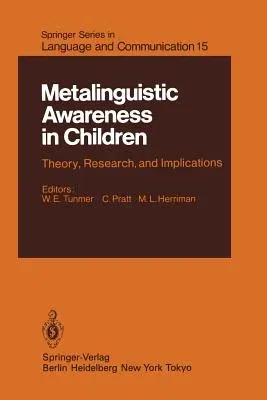J Bowey
(Author)Metalinguistic Awareness in Children: Theory, Research, and Implications (Softcover Reprint of the Original 1st 1984)Paperback - Softcover Reprint of the Original 1st 1984, 7 December 2011

Qty
1
Turbo
Ships in 2 - 3 days
In Stock
Free Delivery
Cash on Delivery
15 Days
Free Returns
Secure Checkout
Part of Series
Springer Language and Communication
Part of Series
Springer Series in Language and Communication
Print Length
238 pages
Language
English
Publisher
Springer
Date Published
7 Dec 2011
ISBN-10
3642691153
ISBN-13
9783642691157
Description
Product Details
Book Edition:
Softcover Reprint of the Original 1st 1984
Book Format:
Paperback
Country of Origin:
NL
Date Published:
7 December 2011
Dimensions:
23.39 x
15.6 x
1.37 cm
ISBN-10:
3642691153
ISBN-13:
9783642691157
Language:
English
Location:
Berlin, Heidelberg
Pages:
238
Publisher:
Weight:
362.87 gm

